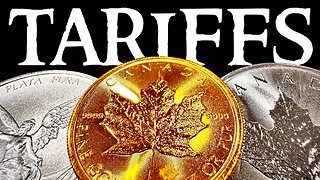Premium Only Content

Bitcoin Minig How to Get Started with Bitcoin Mining
How to Get Started with Bitcoin Mining
If you're just getting started with Bitcoin mining, it can seem overwhelming with all the different hardware and software choices you have to make. On top of that, there's also the issue of how to even get bitcoins in the first place! But don't worry – I'm here to help break it all down step-by-step and show you exactly how to get started with Bitcoin mining. Let's get started!
Become familiar with different types of cryptocurrency
The world of cryptocurrency is always changing, so becoming familiar with different types is vital. Bitcoin mining, for example, is only profitable if you're using special mining hardware and software that are typically expensive. For all cryptocurrencies besides Bitcoin (ie, altcoins), there are two main options: pool mining or solo mining. Pool mining allows multiple miners to work together on one block and share their rewards accordingly, while solo mining requires each individual miner to do everything alone. If you have a small budget, it's best to start out with solo mining until you have enough money saved up to buy your own equipment. If you want to learn more about different types of cryptocurrency and how they work, check out our guide here. When to mine? Mining isn't an activity that can be carried out 24/7. It takes time, effort, and energy—all of which cost money—so most miners choose to mine at night when power rates are lower than during daytime hours. It also pays to keep an eye on prices in order to figure out when you can make a profit by selling your mined coins.
Understand why you should mine cryptocurrencies
Cryptocurrencies have made it easier for more people to get involved in cryptocurrency investing. While mining used to be reserved for only those with expensive computing setups, new cryptocurrencies have made it possible for anyone who owns a computer or smartphone (or even a PlayStation) to mine digital currencies from home without spending thousands on equipment. If you're interested in learning how you can start mining bitcoins and other types of currency, keep reading. We'll cover what you need to know about getting started with bitcoin mining. We'll also take a look at some of the most popular tools you can use to mine coins from home. For example: [Hint: Head over to Amazon and pick up one of these cheap USB miners]
Cryptocurrency mining rigs
You’ll need a dedicated device—typically a computer but sometimes a GPU or FPGA—to mine bitcoins, so if you’re serious about getting into bitcoin mining, you might want to purchase one. In terms of hardware, there are several ASIC devices available for cryptocurrency mining. You’ll be able to find them on online marketplaces such as eBay and Amazon, along with pre-assembled rigs that include all of their parts. Some other useful tools that can help you get started: - A wallet (Coinbase is a popular option) - A pool account (many pools have free accounts) - An exchange account (Coinbase is also an exchange) - A miner program (CGMiner is open source and easy to use) Once your rig is set up, it will take time to generate any sort of meaningful income from mining. There’s no guarantee of profit, and many people end up spending more money than they make. The best way to approach bitcoin mining is like any other financial endeavor: do your research first, then decide whether it’s worth it.
Choose which cryptocurrency to mine
There are numerous cryptocurrencies for which you can mine. The most popular cryptocurrency for mining is bitcoin (BTC), followed by Ethereum (ETH). As of February 2017, there were many other cryptocurrencies that could be profitable to mine. We also have a good list of altcoins, if you’re interested. For example, one alternative currency called Monero (XMR) is very promising because it has a low market cap and an active community of developers who are constantly implementing new features. It’s also worth noting that some currencies like Zcash (ZEC) do not allow miners to use GPUs or special hardware—instead they rely on CPUs and open-source software like OpenCL and CUDA. This means you will need an old computer or laptop in order to start mining Zcash without expensive hardware.
Install your chosen cryptocurrency wallet onto your computer
The first step in getting started with bitcoin mining is to install your chosen cryptocurrency wallet onto your computer or smartphone. You will use a cryptocurrency wallet every day, as it contains all of your transaction history and allows you to buy and sell bitcoin. The most popular cryptocurrency wallet is called Coinbase, as they can be used easily on smartphones and computers. If you do not already have a Coinbase account, sign up for one here . Once you’ve signed up for a Coinbase account and installed their app, navigate to Settings and make sure that Bitcoin Cash is selected under Receive Money. This ensures that any money transferred from your bank account into your Coinbase account will automatically go towards buying bitcoin (as opposed to being converted into dollars).
Download your chosen cryptocurrency software
The software you’ll need depends on which currency you want to mine. For bitcoin, there are several options available: GUIMiner is a popular Windows mining tool; EasyMiner and BFGMiner work well for Linux systems. You can also use a cloud-based service like HashFlare or Genesis Mining. Once downloaded, open your chosen software and configure it to connect to one of your cryptocurrency accounts (most services offer detailed instructions). Then all that’s left to do is sit back and watch your money (hopefully) start rolling in! Be aware, however, that some cryptocurrencies such as Ethereum and Zcash require more processing power than others—if you’re not using a high-end system, don’t expect results too quickly. This may take anywhere from a few days to several weeks depending on how powerful your computer is. Also be aware that different currencies have different ways of determining rewards—Ethereum gives users three ether coins per block mined while Zcash gives users half of their reward per block mined every 12 minutes.
Create an account on your chosen cloud mining website
If you’re going to mine bitcoins, you’ll need a bitcoin wallet (like Coinbase) and a place to store your mined coins. There are several cloud mining options out there. The one we recommend is Hashflare. If you sign up through that link, we’ll give you a $10 credit towards your hashpower purchase. Once you have an account setup and funded, you can begin buying hashing power for your bitcoin mining rig! For example, here is our tutorial on how to get started using Hashflare. You can also read our review of Genesis Mining or check out BitClub Network if you’d like more information on other reputable cloud-mining services. Again, make sure you do plenty of research before making any purchases. Remember, at first it might be better to buy a small amount of hashpower while you learn more about mining! This way if it doesn’t work out for some reason (e.g., difficulty skyrockets), then it isn’t such a big loss from your initial investment.
Start earning Bitcoins!
If you’ve been keeping up with how much a single bitcoin is worth in US dollars or some other fiat currency, you’re probably wondering if you can cash in on your investment. The short answer is yes—to an extent. You can exchange bitcoins for money, but first you need a place to keep them. Which brings us to our next point: security. There are several ways to secure your bitcoins once you have them, but one of the most popular is to store them offline in what’s called cold storage. This means that instead of storing your coins at an exchange like Coinbase or Bitstamp, where they could potentially be hacked and stolen, you hold onto them yourself using a wallet installed on your computer or mobile device. Cold storage also helps protect against theft by making it more difficult for people to physically steal your coins. But here’s something you should know about cold storage: It isn’t really all that safe. In fact, according to a report from Bloomberg Businessweek , only three percent of all stored bitcoins have never been spent—which indicates that about ninety-seven percent of bitcoins stored in cold storage may actually be lost forever due to human error or technological failure.
-
 LIVE
LIVE
Dr Disrespect
4 hours ago🔴LIVE - DR DISRESPECT - TARKOV - ZERO TO HERO RAIDS ONLY
3,896 watching -
 1:13:51
1:13:51
Candace Show Podcast
3 hours agoEXCLUSIVE! Did Ryan Reynolds Extort Hollywood Execs? | Candace Ep 143
45K47 -
 LIVE
LIVE
Darkhorse Podcast
3 hours agoThe 263rd Evolutionary Lens with Bret Weinstein and Heather Heying
913 watching -
 9:37
9:37
Silver Dragons
2 hours agoGoodbye Cheap Silver - How the Tariffs Will Change Stacking Forever
2.21K -
 37:33
37:33
CryptoWendyO
2 hours ago $0.47 earnedWORST DAY IN CRYPTO HISTORY $10 Billion in Liquidations!
5.65K7 -
 57:01
57:01
PMG
3 hours agoHannah Faulkner and Dr. Bryan Ardis | Don't Fall For the Bird Flu!!!
5.99K -
 1:18:00
1:18:00
Russell Brand
1 day agoUFOs, Whistleblowers, and Government Lies – The Truth with Jeremy Corbell – SF530
174K68 -
 1:57:47
1:57:47
The Charlie Kirk Show
4 hours agoThe Most Beautiful Word in English + Confirm Tulsi! | Navarro, McCain, Posobiec | 2.3.2025
169K51 -
 1:13:03
1:13:03
Michael Franzese
4 hours agoRATING Trump’s First Two Weeks In Office
43.4K22 -
 1:43:17
1:43:17
Benny Johnson
5 hours agoBREAKING: Mexico SURRENDERS To Trump, Locks Down Border | Mass FBI Firings, Deep State PURGE in DC
96.6K145